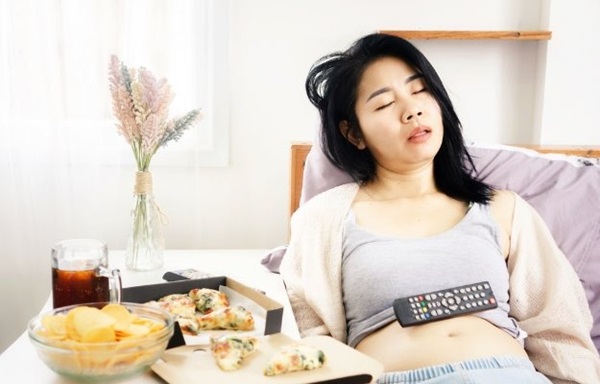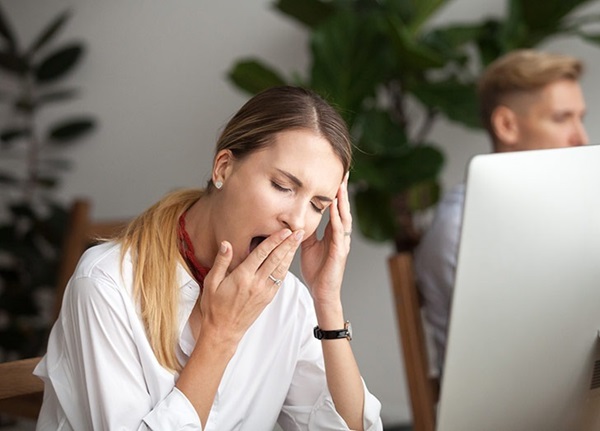Have you ever noticed feeling sleepy or tired after a satisfying meal? It’s a common phenomenon that many people experience, often referred to as “postprandial somnolence” or simply the “food coma.”
You may have heard that feeling sleepy after eating happens because your body redirects blood from the brain to the digestive tract—but science has shown that this isn’t true. Feeling tired after eating comes from a mix of different things your body does and how you behave. While you might not be able to stop it completely, there are things you can do to make it less intense.
Is feeling sleepy after eating normal?
Feeling sleepy after a meal is quite common, especially after lunch. However, some people feel it more strongly than others, while some don’t feel it at all. Those who tend to be awake late into the night and individuals with attention deficit hyperactivity disorder (ADHD) might be among those who don’t experience the post-lunch dip.

While most people feel sleepy after eating at least some of the time, feeling excessively sleepy during the day could signal another issue such as insomnia, sleep apnea, neurological disorders, endocrine disorders, and mood disorders such as depression can cause excessive daytime sleepiness.
Short Description of Postprandial Somnolence
Postprandial somnolence is a scientific term used to describe feeling sleepy after eating. This phenomenon is particularly common especially after lunch, known as the “post-lunch dip.” Researchers have found several biological reasons why people get sleepy after eating, including:
- Cytokines: Cytokines are proteins that aid the body’s immune and inflammatory responses which are also linked to feelings of fatigue when their level changes. After consuming, especially high-calorie food meal the concentration of certain cytokines in your body increases, which can contribute to feeling fatigued.
- Circadian rhythms: Circadian rhythms are natural changes in body functions like temperature and hormones, metabolism, and other physiological processes that follow a 24-hour cycle. During the early afternoon, the circadian signals governing wakefulness typically diminish, potentially resulting in sleepiness after lunch.

- Sleep Drive: Sleep drive refers to the longer you’ve been awake, the more your desire to sleep. So, you are more likely to feel sleepy after an afternoon or evening meal compared to breakfast.
- Hormonal changes: Eating leads to a decrease in hormones that keep you alert and an increase in hormones that make you feel sleepy, like melatonin and serotonin.
Also read, Wake Up Refreshed: How Sleeps Eight’s Smart Beds Enhance Your Morning Routine
What kinds of foods can induce drowsiness?
The act of eating is not only the reason for feeling sleepy that sometimes follows a meal. You may also feel drowsiness even if you skip your post-lunch. However, certain foods can make you more tired after consuming than others, according to research.
- High-fat foods
You may experience more tiredness after eating foods that contain high fat. Similarly, consuming diets that contain too much fat can disrupt your sleep at night, making you even more tired during the day. To avoid feeling sleepy stop eating foods high in fats, particularly saturated fats like fried foods, pastries, pizza, potato chips, and processed meats.
- Trypthon containing food
Consuming tryptophan foods like turkey can help people fall asleep faster. Tryptophan turns into melatonin and serotonin in the body, both making you feel sleepy. But tryptophan alone isn’t solely responsible for feeling sleepy after big holiday meals. It’s more about eating a “heavy” meal with lots of calories from both fat and carbohydrates that leads to post-meal sleepiness.

- High-carbohydrate foods
Eating a high-carbohydrate meal may lead to make you feel sleepy than a low-carbohydrate one. To prevent drowsiness, stop consuming foods and drinks with lots of processed sugars and starches, such as sweets, sugary drinks, and white bread. These can cause your blood sugar to spike quickly, increasing the chance of feeling tired.
What other factors contribute to feeling sleepy besides eating?
Beyond the influence of food on our energy levels, numerous factors can contribute to feelings of sleepiness throughout the day. While postprandial somnolence, or the drowsiness experienced after eating, is well-known, it’s essential to recognize that our bodies are subject to various influences that can affect our alertness and propensity for sleepiness. From environmental factors to lifestyle choices and underlying health conditions, understanding the broader spectrum of contributors to daytime fatigue is crucial for optimizing our energy levels and overall well-being.
- Sleep Deprivation
Sleep deprivation is also one of the factors that can also lead to sleepiness. If you have disturbed sleep or don’t get enough sleep at night, you’re more likely to feel very sleepy after eating because your urge to sleep is stronger.

- Low Iron levels
Iron deficiency can also increase your chance of developing restless legs syndrome (RLS), which can disrupt your sleep at night and make you excessively sleepy during the day.
- Level of Blood Sugar: High or Low
Feeling tired can be a sign of either high or low blood sugar levels. Individuals dealing with diabetes are particularly vulnerable to these issues because their blood sugar levels can be hard to control, often due to taking too much or too little insulin. High or low blood sugar can also happen because of diet, alcohol, or changes in physical activity.
Tips To Stop Feeling Tired After Eating
While you might not be able to get rid of feeling sleepy after eating entirely, there are some things you can do to reduce the chances of it happening.
- To avoid feeling sleepy after lunch, try having a caffeinated drink. However, to prevent disruptions to your sleep at night, it’s best to avoid caffeine for at least eight hours before bedtime.
- If possible, engage in moderate exercise like walking or biking before you start feeling tired after eating. This can boost your energy levels and prevent fatigue.
- Drink enough water throughout the day as it can help you stay alert and ward off sleepiness.
- Eat a lighter meal with fewer calories as it can result in less sleepiness compared to a heavier, high-calorie meal. Avoid overeating.
- Use natural light as the sunlight is a key signal for your body’s internal clock, so spending time outdoors or in front of a lightbox after a meal can help reduce or prevent post-meal fatigue.
Frequently Asked Question
Does postprandial sleepiness occur after every meal?
Postprandial sleepiness may not occur after every meal, especially if meals are light or consumed during times of high alertness.
Are there specific meals that are more likely to cause sleepiness?
Large meals, particularly those high in carbohydrates and fats, are more likely to induce postprandial sleepiness. Meals that are rich in simple sugars or processed foods can also lead to rapid spikes and subsequent crashes in blood sugar levels, contributing to feelings of fatigue.
You may also like to read, The Impact of Technology on Sleep: Navigating the Digital World for Restful Nights
